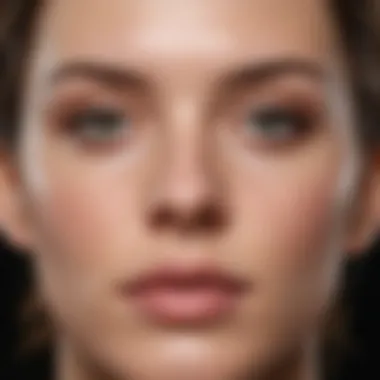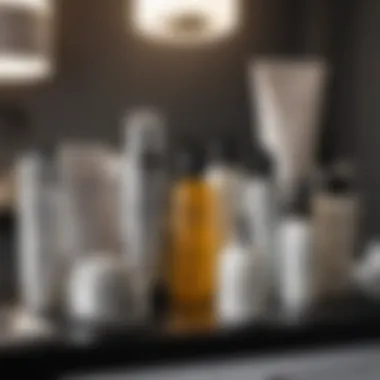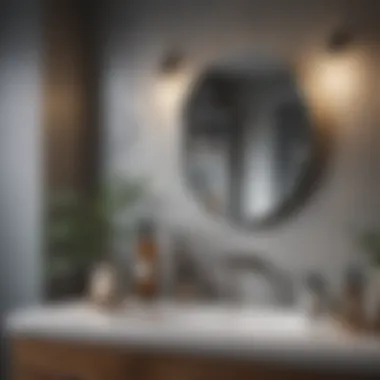Effective Strategies for Eliminating Blackheads at Home


Intro
Blackheads are a persistent skin issue for many. They form when hair follicles become clogged with oil, dead skin cells, and other impurities. Particularly common in areas like the nose and forehead, blackheads can result in an uneven skin appearance that many find bothersome. While commercial products promise results, these often contain harsh chemicals. Fortunately, there are effective and natural strategies for removing blackheads at home.
With this article, you will learn various remedies and practices that can help clear your skin without the need for invasive procedures or purchases. Understanding your skin's needs and using simple home remedies can lead to significant improvements. In the following sections, we will delve into the causes of blackheads, effective home solutions, preventive measures, and ways to maintain overall skin health. Whether you have occasional blackheads or face more chronic issues, these strategies are aimed to be practical and straightforward.
Understanding Blackheads
Before implementing any strategies, it's crucial to understand what blackheads are and why they appear. Blackheads often emerge due to several factors, including:
- Overproduction of sebum by oil glands.
- Buildup of dead skin cells that clog pores.
- Factors such as hormonal changes, diet, or even certain medications.
Understanding these root causes informs the solutions that can be developed for effective treatment.
Factors Contributing to Blackhead Formation
Here are additional contributing factors:
- Hormonal fluctuations: Changes during puberty, menstruation, or stress can increase sebum production.
- Dietary habits: Excessive consumption of dairy or sugary items might worsen skin condition.
- Inadequate skincare: Not adhering to a daily skincare regime often leads to clogged pores.
Understanding Blackheads
Understanding the nature of blackheads is essential for anyone seeking to maintain clear and healthy skin. This article highlights the various aspects related to blackheads, emphasizing their characteristics, causes, and impact on different skin types. By comprehending blackheads in depth, readers will be better equipped to tackle them effectively at home.
What Are Blackheads?
Blackheads are a form of acne that appears on the skin when hair follicles become clogged with oil and dead skin cells. Unlike other types of acne, blackheads have a characteristic black or dark appearance. This discoloration occurs due to the oxidation of melanin when exposed to air. They commonly develop on the face, particularly in the T-zone, which includes the forehead, nose, and chin. Blackheads are not harmful but can be unsightly and lead to more severe forms of acne if not treated.
Causes of Blackheads
Blackheads result from an accumulation of sebum and dead cells in the pores. Several factors contribute to their formation, including:
- Excess Oil Production: Hormonal changes or skin types that naturally produce more oil often lead to clogged pores.
- Poor Exfoliation: Failure to remove dead skin effectively enables buildup in hair follicles.
- Certain Medications: Some medications can increase oil production, leading to more Blackhead formation.
- Diet: Dietary choices and irregular eating habits may play a role, especially if they trigger oil production.
- Cosmetic Usage: Heavy and non-comedogenic products can contribute to the occurrence of blackheads.
Identifying the root causes of blackheads is critical for effective treatment and prevention, as it allows individuals to take proactive measures in their skin care regimes.
Skin Types and Blackheads
There is a clear relationship between skin type and the likelihood of developing blackheads. Various skin types can influence how often and severely blackheads appear:
- Oily Skin: This type has a higher propensity for blackheads due to excess sebum.
- Combination Skin: Those with combination skin may experience blackheads in oilier areas, such as the T-zone.
- Dry Skin: Less prone to blackheads, though improper care can lead to clogged pores.
- Sensitive Skin: Individuals with sensitive skin may struggle with blackheads due to inflammation and irritation if they use the wrong products.
Understanding one's skin type is pivotal in customizing skin care and selecting appropriate home remedies, significantly impacting both prevention and treatment strategies.
Home Remedies for Blackheads
Blackheads present a pervasive issue for many. Using home remedies to address this concern is practical and cost-effective. Home remedies can often provide gentler alternatives to commercial products. They typically involve natural ingredients that you might already have at home. Therefore, safety and accessibility make them a popular choice for maintaining skin health.
Exfoliation Techniques
Exfoliation is a crucial part of blackhead removal. It rates highly among various home remedies due to its effectiveness in sloughing off dead skin cells and preventing clogged pores.


Chemical Exfoliants
Chemical exfoliants utilize active compounds to loosen the bonds holding dead skin cells together. Substances like salicylic acid or glycolic acid work deeply within the skin's surface to enhance skin texture and combat blackheads effectively. The primary benefit lies in their ability to penetrate the pores and reduce oil build-up. Chemical exfoliants offer a more uniform exfoliation compared to physical methods due to their ability to work on a cellular level.
The downside is that they can irritate more sensitive skin types. It is vital to patch test any of these products first. Balance is key as overuse could lead to dryness or irritation.
Physical Exfoliants
Physical exfoliants, like scrubs or brushes, rely on their abrasive textures to remove dead skin. They provide an immediate smoothness; you can often see instant results. Choices include sugar scrubs or gentle rice powder exfoliants. Users often prefer them for their simplicity and the tangible feel of results right after use.
However, they might not target the oil within the pores as deeply as their chemical counterparts. Over-exfoliating can also damage the skin barrier when using these products more often.
Clay Masks
Clay masks are another effective option for combating blackheads. They work by absorbing excess oil and drawing out impurities from the skin.
Bentonite Clay
Bentonite clay is well-known for its strong oil-absorbing properties. When used as a face mask, it expands and forms a gel-like substance that traps impurities, making it perfect for reducing the clogging of pores. This clay is beneficial for oily skin types, as it helps maintain skin clarity by pulling out toxins and debris from within.
However, it is essential to keep in mind that it can be quite drying, especially if left on for too long. Therefore, consider using it in moderation.
Kaolin Clay
Kaolin clay is milder compared to Bentonite clay. It is suitable for various skin types, including sensitive skin. Kaolin clay softens the skin while absorbing oil without excessive dryness. This makes it a popular choice for newer skin care users or those with mild skin sensitivities. Its gentle nature, however, sometimes means it may not quite perform to the same level as Bentonite in terms of deep pore cleansing.
Steam Treatments
Steam treatments provide an effective method to open up clogged pores. The steam from hot water helps to soften the skin and loosen dirt.
By following a steam treatment with proper exfoliation, you enhance its effectiveness significantly. After steaming, pores are more receptive to extracts and other active substances.
Keep in mind to be cautious as prolonged exposure to steam can cause irritation.
Honey and Sugar Scrubs
A mixture of honey and sugar works wonders in creating a natural scrub. Honey has antimicrobial properties, making it an excellent ingredient for skin health. Sugar provides the texture needed for physical exfoliation. The honey contributes hydration and helps remove any residual debris.
Simply combine equal parts honey and sugar for straightforward application. Make sure not to carry out this remedy excessively, as over-scrubbing could irritate the skin.
Aloe Vera Application
Aloe vera is celebrated for its soothing properties. Applying aloe vera to affected areas can alleviate inflammation and redness associated with blackheads. This herb keeps the skin moisturized and healthy while actively combating bacteria.
Baking Soda Treatments
Using a paste of baking soda and water can give immediate exfoliation. This compound acts by delicately scrubbing the skin, removing dead cells, and opening up pores. Baking soda keeps pH levels balanced. However, it can also be harsh for some, so it is wise to employ this treatment sparingly.
Apple Cider Vinegar Use
Apple cider vinegar is known for effective astringent properties. Diluting it with water applies it to the skin, often keeping pores clear while balancing oil production.
Essential Oils and Blackheads


Essential oils like tea tree oil and peppermint oil can also be significant help in controlling blackheads due to their antibacterial properties.
Tea Tree Oil
Tea tree oil offers immense benefits in treating mild acne and blackheads. Its high concentration of natural antiseptics helps to unclog pores and elinate excess bacteria present on the skin surface. It’s a favorable point that this oil is popular among skin care enthusiasts for its clear skin improvements.
On the flip side, direct application of essential oils without dilution may cause mild irritation for some skin types, so patch testing is essential here as well.
Peppermint Oil
Peppermint oil serves as a refreshing element in many home remedies. Its cooling properties help reduce inflammation, making it a nice addition to blackhead prevention routines. This could also invigorate your overall skincare regimen.
It pairs benefit-wise well but also can spark minor reactions. Like tea tree oil, be careful with undiluted application.
Home remedies can be more impactful when combined. Always consider finding a stable routine that best suits your own skin needs. Happy skincare!
Preventive Measures
Preventing blackheads is a more effective strategy than treating them after they form. Blackheads not only affect personal appearance but can also signal underlying skin issues. Adopting preventive measures can diminish the likelihood of their occurrence and maintain skin clarity.
Establishing a Routine
Creating a daily skincare routine is key. Consistency helps keep your skin and pores clean. Begin with gentle cleansing. Use a mild cleanser suitable for your skin type twice a day. Overwashing can strip natural oils, causing the skin to produce more sebum. Exfoliation should follow. Incorporating chemical or physical exfoliants helps remove dead skin cells, reducing pores blockage. Aim to exfoliate two to three times a week while being cautious not to irritate the skin.
Choosing the Right Products
Selecting appropriate skincare products plays an important role. Non-comedogenic products allow skin to breathe without clogging pores. Look for ingredients like salicylic acid or glycolic acid. These can penetrate pores and prevent buildup. When initiating your skincare journey, patch testing new products is recommended to prevent adverse reactions. Mindfulness in labeling ensures wise choices in product selections.
Dietary Considerations
Diet influences skin health significantly. Consumption of a balanced diet rich in fruits, vegetables, and whole grains contributes positively. Minimizing refined sugars and processed foods can reduce inflammation and improve skin clarity. Adding Omega-3 fatty acids, found in fish like salmon and walnuts, promotes better skin appearance. Always remember to stay hydrated; drink sufficient water throughout the day to maintain hydration and support skin function.
Managing Stress Levels
Emotional well-being is often overlooked regarding skin health. Elevated stress levels can lead to hormonal fluctuations that induce oil production. Effective stress management techniques are beneficial. Activities like regular physical exercise, meditation, or practicing hobbies can help reduce stress. Prioritizing mindful practices in your daily life allows the skin to reflect your internal wellness positively.
"An ounce of prevention is worth a pound of cure."
Thus, addressing these preventive measures not only curtails blackhead formation but also contributes to overall skin health. Recognizing factors that play a role and yielding control through consistent practices can deliver noticeable results.
Best Practices for Skin Health
Maintaining optimal skin health is crucial for preventing blackheads. This section delves into best practices that each individual can incorporate into their routine. These practices not only aid in combatting blackheads but also promote overall skin vitality. Implementing these habits showcases a commitment to self-care and enhances physical appearance, particularly for those with an interest in fashion and personal style.
Hydration and Its Importance
Hydration serves as a foundation for healthy skin. Sufficient water intake helps to flush out toxins and improves skin elasticity. A well-hydrated body fosters a balanced complexion, minimizing the likelihood of clogged pores that lead to blackheads.
Incorporating hydrating foods into your diet can also enhance skin moisture levels. Fruits such as watermelon or cucumber can provide hydration alongside their vitamins. Aim to drink at least eight 8-ounce glasses of water daily, adjusting as needed based on factor like your lifestyle and workouts.
Remember, hydrated skin can appear healthier and more vibrant, complementing any fashion statement. Keeping your skin hydrated matters significantly, particularly for maintaining the fresh look that many desire.


Sun Protection Strategies
Protecting skin from harmful UV rays is essential for long-term health. Though exposure may create an immediate tan, it ultimately damages skin and can lead to various issues, including increased oiliness that exacerbates blackheads. Regular use of sunscreen, even on cloudy days, can minimize these risks.
When choosing a sunscreen, look for broad-spectrum options that block out UVA and UVB rays. A product with an SPF of 30 or higher is often recommended. This helps ensure adequate protection against harmful sunlight, contributing to a clearer complexion.
Additionally, wearing protective clothing and sunglasses can aid in safeguarding skin while simultaneously being a stylish accessory choice. Opting for natural fabrics and shades enhances your overall aesthetic approach.
Regular Dermatologist Consultations
Seeking professional guidance from a dermatologist can dramatically improve skin health. Regular check-ups allow dermatologists to identify specific issues related to skin type, including predispositions to blackheads. Early intervention can help maintain clarity and brightness in the skin.
During consultations, individuals can receive customized treatment and advice tailored to their unique needs. Your dermatologist may recommend specific products or treatments that align with your skin's requirements, including potential medical-grade solutions sometimes essential in sever cases of blackheads.
Ultimately, integrating professional input does not only remove uncertainties but also empowers individuals with information, enabling them to navigate their skincare journeys with informed strategies.
Adopting these best practices creates a proactive approach toward skin health. In the pursuit of eliminating blackheads, remember that consistent care is the core principle.
When to Seek Professional Help
Identifying when to consult a professional regarding blackheads is crucial for maintaining skin health. While many blackheads can be treated at home with natural methods and remedies, some cases may require specialized care. A dermatologist can assess your skin condition and provide tailored solutions. Early intervention can prevent further complications and enhance skin appearance.
Identifying Severe Cases
Several signs may indicate the need for professional advice. First, persistently clogged pores that have not improved after at-home treatments may suggest a more severe issue. If blackheads are frequently accompanied by inflammation, pain, or other forms of acne, this is often a signal that home remedies are inadequate.
Consider seeking help if your self-care routine shows little to no improvement over a significant period. Chronic blackhead formation, particularly in combination with oily skin or problematic areas, can indicate an underlying skincare issue. Remember, early detection and professional evaluation can result in more effective treatments.
"Taking care of your skin is a long-term investment."
Treatment Options Available
Once you consult a dermatologist, various treatment options may be presented. The best-fit solution depends on the specific needs of your skin. Here are some commonly suggested approaches:
- Prescription Medications: Topical retinoids, like tretinoin, can help by improving skin turnover. This approach contributes to clearer skin over time.
- Chemical Peels: These involve applying a chemical solution that accelerates the shedding of dead skin cells, promoting the growth of fresh skin.
- Extraction Procedures: In-office extractions by skincare professionals can safely remove blackheads, reducing the chances of scarring.
- Professional Exfoliation: A dermatologist may recommend in-office treatments, such as microdermabrasion, to improve skin texture and reduce blackhead occurrence.
Selecting a professional reduces the likelihood of damaging your skin through improper techniques often found in at-home treatments. With the right guidance, you can achieve smoother skin free from blackheads efficiently.
Finale
Understanding how to effectively manage and eliminate blackheads can greatly enhance your skincare journey. This article serves as a comprehensive guide, equipping you with valuable insights and remedies that are pragmatic and easy to incorporate into daily routines. Many people struggle with skin imperfections like blackheads, thus knowing how to deal with,, them at home offers substantial benefits.
Summary of Techniques
Each home remedy discussed provides unique advantages:
- Exfoliation Techniques: Regular exfoliation can remove dead skin cells that clog pores, significantly reducing blackhead formation.
- Clay Masks: Applying clay masks like bentonite or kaolin engages passion for purity productiveness. They absorb excess oil and impurities from the skin.
- Steam Treatments: Steam helps open pores, which aids in unclogging and purifying the skin.
- Honey and Sugar Scrubs: These natural scrubs not only exfoliate but also offer antibacterial benefits.
- Aloe Vera Application: This plant is renowned for its healing properties and works remarkably on problem skin.
- Baking Soda Treatments: Baking soda can be beneficial as an enforcement and mild exfoliant.
- Apple Cider Vinegar Use: This remedy works wonders in balancing skin pH and controlling sebum production.
- Essential Oils: Solutions like tea tree oil have proven antibacterial properties ideal for treating blackheads.
Engaging with these techniques allows individuals to take a proactive approach to skin care.
Final Thoughts on Blackheads
Addressing blackheads is essential for maintaining clear and healthy skin. It is crucial to recognize personal skin conditions and adjust the chosen strategies accordingly. Prevention plays a pivotal role. Regular routines, suitable products, and lifestyle choices can manifest in significant ways. These include improved texture, reduced occurrences, and diminished confidence-loss battles.
When adopting these remedies, set realism. Results require time and persistence. Cultivating a consistent skincare routine brings notice to undesirable aspects without the need for drastic measures, like expensive treatments.
Managing blackheads should not merely focus on removing them temporarily. It requires fostering a legitimate understanding for long-term viral strategy toward comprehensive skin health.
Overall, being informed and resourceful empowers individuals to navigate their skincare. This observation creates space for a wiser approach to affect lifestyle, featuring elegance, awareness, and confidence—all while achieving notable aesthetic goals.















